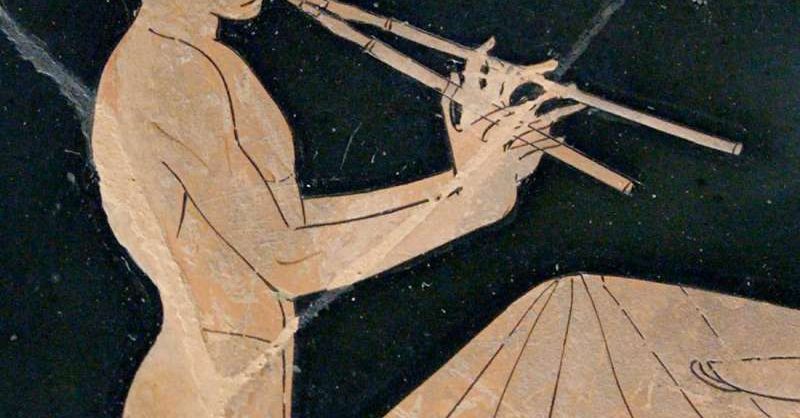Imagine trying to reconstruct the music of the Beatles 2,500 years from now, if nothing survived but a few fragments of the lyrics. Or the operas of Mozart and Verdi if all we had were pieces of the librettos.
In a 2013 BBC article, musician and classics professor at Oxford Armand D’Angour used these comparisons to illustrate the difficulty of reconstructing ancient Greek song, a task to which he has set himself for the past five years.
The comparison is not entirely apt. Scholars have long had clues to help them interpret the ancient songs that served as vehicles for Homeric and Sapphic verse or the later drama of Aeschylus, almost all of which was sung with musical accompaniment. In a recent article at The Conversation, D’Angour points out that many literary texts of antiquity “provide abundant and highly specific details about the notes, scales, effects, and instruments used,” the latter including the lyre and the aulos, “two double-reed pipes played simultaneously by a single performer.”
But these musical instructions have proved elusive; “the terms and notations found in ancient sources—mode, enharmonic, diesis, and so on—are complicated and unfamiliar,” D’Angour writes. Nonetheless, using recreations of ancient instruments, close analysis of poetic meter, and careful interpretation of ancient texts that discuss melody and harmony, he claims to have accurately deciphered the sound of ancient Greek music.
D’Angour has worked to turn the “new revelations about ancient Greek music” that he wrote of five years ago into performances that reconstruct the sound of Euripides and other ancient literary artists.
The video shows a choral and aulos performance of Athanaeus’ “Paean” from 127 BC and Euripides Orestes chorus from 408 BC. D’Angour and his colleagues break in periodically to talk about their methodology.
In the 2017 interview above from the Greek television channel ERT1, D’Angour discusses his research into the music of ancient Greek verse, from epic, to lyric, to tragedy, to comedy, “all of which,” he says, “was sung music, either entirely or partly.” Central to the insights scholars have gained in the past five years are “some very well preserved auloi,” he notes, that “have been reconstructed by expert technicians” and which “provide a faithful guide to the pitch range of ancient music, as well as to the instruments’ own pitches, timbres, and tunings.”
more at opeculture.com




































